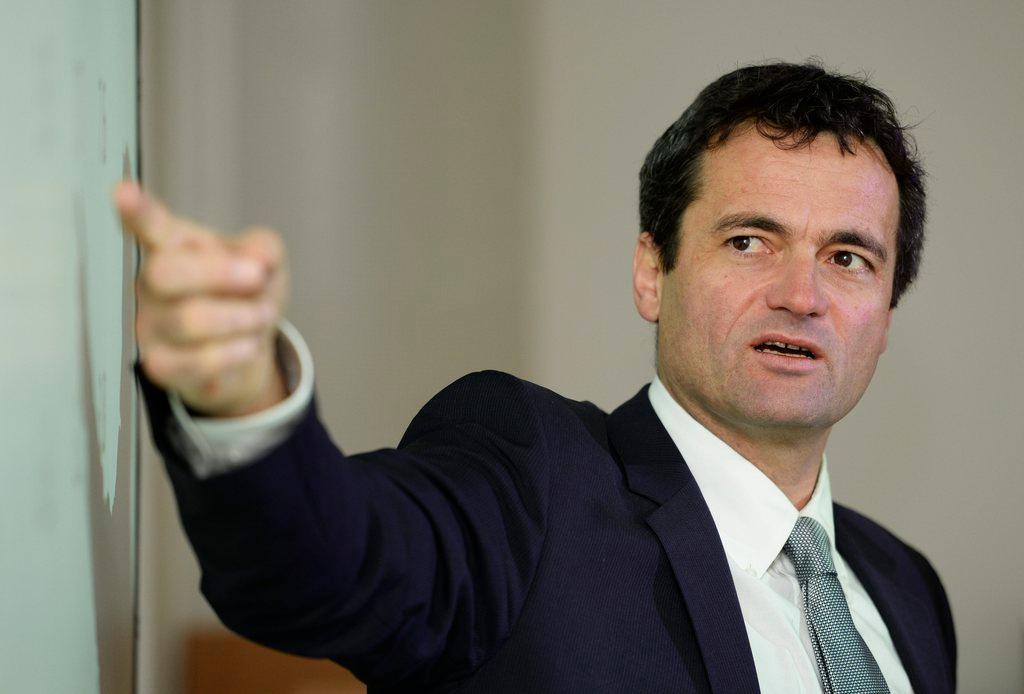
Unconditional basic income: a risky gamble
The introduction of an unconditional basic income for all would have a negative effect on the labour market and vocational training, says Rudolf Minsch, chief economist at the Swiss business federation, economiesuisse. He says it would threaten the cohesion of society and ruin Switzerland’s financial sector.
Rolling around in CHF 0.05 coins on Bern’s parliament square and handing out CHF10 notes for free in Zurich’s main station: the advertising campaign for an unconditional basic income certainly promises the Swiss a golden future.
The notion behind the initiative is that if people are financially secure, they can look after the important things in life and develop their talents. In this way, they would not just help themselves but would also enrich society.
So far, this is utopia. Neither individuals nor society work like the initiators would like us to imagine.

If the state were to guarantee everyone a monthly income, which would – as stated in the initiative proposal – enable them to “have a humane existence and participate in public life”, it would turn our attitude to work upside down.
The rule that every adult is basically responsible for their own subsistence would be nullified for the first time in human history.
There will certainly be some who would use this new financial freedom responsibly – maybe invest it in further training or in starting up their own company.
But it would be tempting to go into a different direction though. Why not shift down a gear or two? Or simply throw in the towel if an exhausting project comes up? Part-time work would no longer be worth it. Employees who did not receive rather more than the intended basic income of CHF 2,500 would simply stay at home.

More
Unconditional income could pave way for future
Young people
For the future of young people, a basic income would be outright irresponsible as they would have less incentive to enter the labour market.
So the benefit of doing a long and possibly very tiring vocational training would be significantly reduced if, while doing so, you could still enjoy hobbies without being put under financial pressure.
For this reason, a basic income also creates a moral dilemma: is our society really willing to finance the livelihood of people who do not want to contribute to our society, even though they could? This has nothing to do with solidarity. In the end, such an antisocial system would threaten the cohesion of society.
On this issue, the current initiative is different from all other projects that have been launched regarding the introduction of an unconditional basic income.
Some Dutch cities have paid selected single social welfare recipients a monthly basic income of €900 (CHF 990) since the beginning of this year. If such a monthly payment substitutes other social welfare benefits, it could very well make sense. It is not a general basic income for everyone though.

More
A basic income for all – the issue before Swiss voters
The Finnish government is pondering similar ideas: it wants to introduce a basic income of €800 to take some burden off its social welfare system and reduce bureaucracy. This is, however, a pretty radical austerity programme.
In Switzerland, the system would be very different as the monthly basic income of CHF2,500 per adult and CHF625 per child would lead to horrendous extra costs.
The initiative’s backers also want to abolish large parts of our social welfare system. But social welfare payments exceed the planned basic income in many cases. This is the reason why we would have to keep our social welfare system and the bureaucracy that goes with it. Would you want a severely disabled person to make ends meet with CHF2,500 per month? Or would it be fair if unemployment was no longer properly insured?
Business world
In order to finance their vision, the initiative’s supporters want to either significantly raise value-added tax or introduce a financial transaction tax.
Both proposals would have detrimental consequences for the Swiss business sector, which is currently extremely competitive and cosmopolitan.
We are already living on an island of high prices – a significantly higher value-added tax would increase shopping tourism, putting many small and medium-sized companies out of business. If introduced on a national level, the financial transaction tax would ruin the Swiss financial sector.
For this reason, the gamble the initiative backers are getting involved in is pretty risky. In reality, the golden circle they have printed on their posters is a big black hole.
The views expressed in this article are solely those of the author, and do not necessarily reflect the views of swissinfo.ch.
Opinion series
swissinfo.ch publishes op-ed articles by contributors writing on a wide range of topics – Swiss issues or those that impact Switzerland. The selection of articles presents a diversity of opinions designed to enrich the debate on the issues discussed.

In compliance with the JTI standards
More: SWI swissinfo.ch certified by the Journalism Trust Initiative

























You can find an overview of ongoing debates with our journalists here . Please join us!
If you want to start a conversation about a topic raised in this article or want to report factual errors, email us at english@swissinfo.ch.